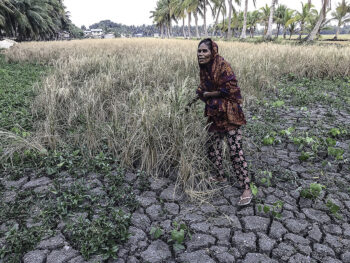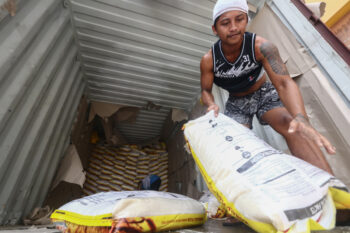
QUEZON CITY (MindaNews / 20 March) – In 2004, Thai lawyer and human rights activist Somchai Neelapaijit disappeared. Last seen being dragged out of his car by four men, Somchai left behind a grieving wife and five children. Thus started the journey of his wife, Angkhana, from a happy wife and mother to an internationally admired human rights defender.
Our conversation with Angkhana Neelaijit on “She Talks Peace,” available today on Spotify, Apple, Google podcasts and other platforms, was a revelation. A Magsaysay awardee in 2019, the Foundation board of trustees said of Angkhana: “her unwavering courage in seeking justice for her husband and many other victims of violence and conflict in southern Thailand; her systematic, unflagging work to reform a flawed and unfair legal system, and the shining proof she is that the humblest ordinary person can achieve national impact in deterring human rights abuses.”
She talked about the people she fights for and protects. Angkhana’s efforts has, in no small part, contributed to the Thai Government’s efforts to increase the level of support for human rights. Last September, the Thai Parliament approved in principle a draft law on the Prevention and Suppression of Torture and Enforced Disappearance, criminalizing torture and enforced disappearance. While Thailand still has a long way to go to protect its citizens’ human rights, Angkhana – together with leaders from civil society, academe, the religious sectors – have made headways in the fight for human rights.
Unfortunately, in Thailand as well as here in the Philippines, the scales of justice still tilt in favor of the powerful. Angkhana, together with two other women human rights defenders, is fighting a case filed by a Thai chicken company, a result of her advocacy against the human rights violations of the employees.
Thammakaset Company Limited filed criminal cases against Angkhana, including 28 counts of criminal defamation for postings or re-postings on social media, alleging that the women’s social media engagements violate the Thai Criminal Code. Penalties include sentences of up to two years in prison and fines of up to 200,000 Thai Baht (US$6,400) per count. As Angkhana told us, “that’s a lot of money.”
Many Thai and international human rights and justice organizations have condemned the ongoing judicial harassment of Angkhana and her co-defendants. Front Line Defenders, a vocal human rights advocate and monitoring organization, stated that Angkhana and the other women human rights defenders Puttanee Kangkun and Thanaporn Saleephol, are “being targeted solely for their legitimate and peaceful work for the protection of human rights, specifically on labor rights in Thailand. It urges the Thai government to create an environment that is respectful of the fundamental right of the freedom of expression, which is guaranteed under the Constitution and, by Article 19 of the International Covenant on Civil and Political Rights, to which Thailand is a State Party.”
Angkhana is out on bail.
She shared the trauma of being in court to find justice for her husband, being laughed at in court by the perpetrators who were confident of being cleared of any wrongdoing. And they were. She is in court again, this time defending herself against the charges filed by the chicken company.
She spoke of her ensuing mental health struggles and how she deals with stress: sometimes she sees a psychologist, but she also believes in the power of doing something that one loves, to help manage emotions. In her case, that is sewing. I had to smile when Angkhana spoke about how her mind clears when she sticks the needle into the cloth. If I were the one sewing, I would imagine sticking the needle furiously into my nemesis – ala voodoo. But not Angkhana. To her, sewing focuses her attention on the stitching and nothing else, something she had learned from her mother who was a seamstress. She believes that anger makes people weak. Focus instead on clearing your mind and calming your emotions so you can regain your strength for the struggles ahead.
She shared what has made her proud and given her solace – her five children, who have all found success in their own lives, despite the difficulties they faced after their father disappeared and was smeared in the media as a “bandit lawyer.” One is a judge, and another is with an international NGO.
She also is proud of her role in the successful lobby for the Thai government to ratify the United Nations Convention against Torture and other Cruel, Inhumane and Degrading Treatment or Punishment in 2007 and signing the United Nations International Convention for the Protection of All Persons from Enforced Disappearance in 2012. However, in Thailand as well as here in our own country, violations still happen.
Eavesdrop on our conversation with this humble and courageous Muslim woman from Thailand.
Please Click, Play and Listen on Spotify:
Apple Podcasts: https://apple.co/3u4BeCY
(MindaViews is the opinion section of MindaNews. Amina Rasul is the President of the Philippine Center for Islam and Democracy, an advocate for Mindanao and the Bangsamoro, peace, human rights, and democracy).






